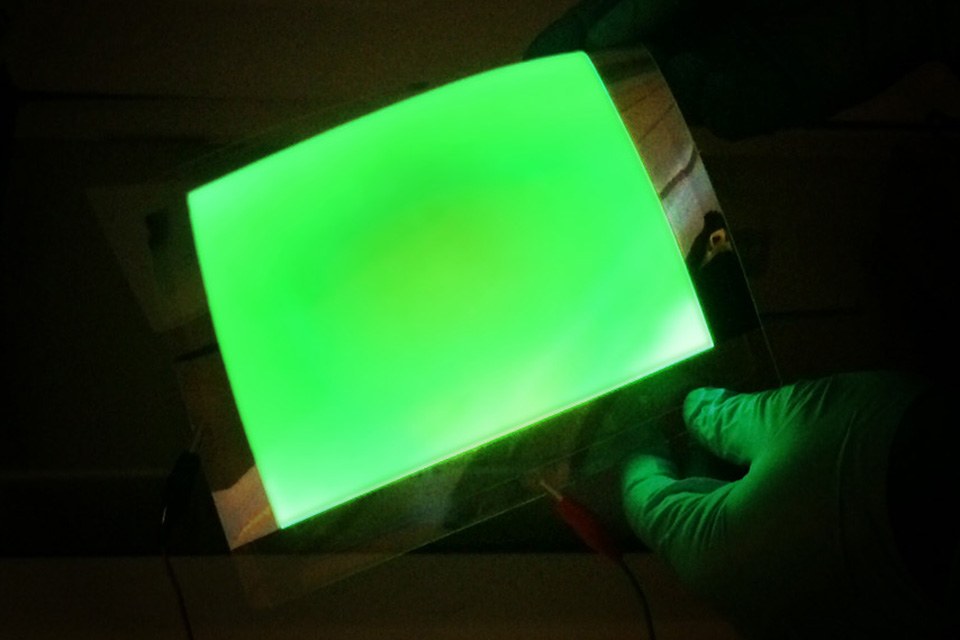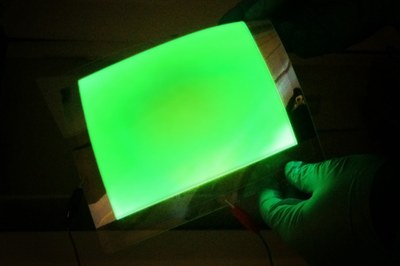European "Flexibilis" Project to Develop Flexible Barrier to Replace ITO in OLED Applications
Currently the commercialisation of Organic Light Emitting Diode (OLED) and Organic Photovoltaic (OPV) based applications such as flexible displays, lighting and energy harvesting devices is heavily dependent on the use of indium tin oxide (ITO) for transparent conducting films, and encapsulation films with high performance barrier properties. There is an industry need for the creation of alternative technologies and materials that have equal performance but deliver low cost, sustainable, transparent and flexible products for these applications. Throughout Europe, it is proving extremely difficult to develop the manufacture of these alternative materials beyond laboratory scale to the position where they are available in large area quantities at a price compatible with supporting market growth.
The pan-European collaborative project ‘Flexibilis’ is addressing these issues and providing the expertise to both develop and test these advances in large area OLED and OPV devices at pilot production scale. The project brings together world class capability in the research, development and scale-up of printed electronics applications. The Centre for Process Innovation (CPI) is coordinating the project, which includes UK based Teer Coatings Limited (part of Miba ), the University of Bolton, and two Austrian organisations namely the research centre NanoTecCenter Weiz Forschungsgesellschaft mbH and High Tech Coatings GmbH (also part of Miba).
Flexibilis began in March 2013 and has already addressing a number of problems which inhibit the uptake of OLED and OPV technologies. Phil Hollis, Programme Manager at CPI, said “The Flexibilis project brings together highly capable European players able to develop the technologies needed for flexible electronics. Already we have demonstrated some promising results in the replacement of ITO and the development of a high performing barrier aiming at OLED and OPV applications. The next challenges will be to refine and apply these results to demonstration devices, and test their suitability at pilot manufacturing scale.”
Flexible electronics is an emerging technology that opens up a host of design opportunities and will lead to the creation of a range of future electronic applications in key market sectors such as print and packaging, healthcare, construction, automotive and aerospace. The ability to develop flexible form factors increases the freedom for designers to embed technology and functionality into their products, creating the opportunity for new, innovative components that are wireless, smarter, interactive, conformable, thinner, lightweight, and rugged which are able to blend more easily into the surrounding environment.
This new way of manufacturing electronics will give rise to a wide range of novel applications such as flexible displays for mobile devices, smart therapeutic bandages for managing and monitoring recovery of wounds, wearable electronics for monitoring and improving performance, wireless medical devices for rapid diagnostics using printed sensors, conformable lighting and intelligent packaging for consumer goods and industrial products, to name but a few.
FLEXIBILIS is an OLAE+ transnational call for collaborative research and development proposals under the European Commission’s (EC’s) ERA-NET Plus scheme. The aim of OLAE + is to attract, qualify and support proposals to develop and stimulate the technology and business relationships within the European printable electronics market, building the supply chain and removing barriers to industrialisation.
About CPI:
CPI is the UK’s National Centre for Printed Electronics, designed to take innovative ideas from concept to production. CPI offers world class, open access capability in the scale up and commercialisation of printable electronics applications. CPI’s facilities and expertise allow clients to understand how their products and processes perform under manufacturing conditions, accelerating their commercial realisation.
Our open innovation model enables clients to develop products and prove processes with minimal risk. We provide assets and expertise so our customers can demonstrate the process before investing substantial amounts of money in capital equipment and training. New products and processes can be shown to be feasible; on paper, in the lab and in the plant before being manufactured at an industrial scale.
By utilising our proven assets and expertise companies can take their products and processes to market faster. There is no down time in production as all of the process development is completed offsite and our technology transfer and engineering teams can help companies to transfer the product or process into full scale production at speed.
www.uk-cpi.com


